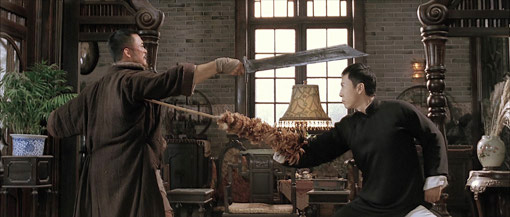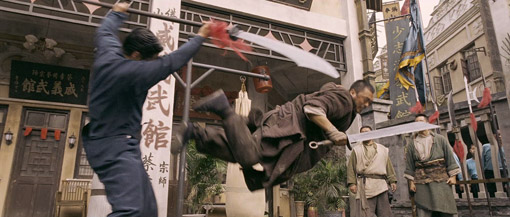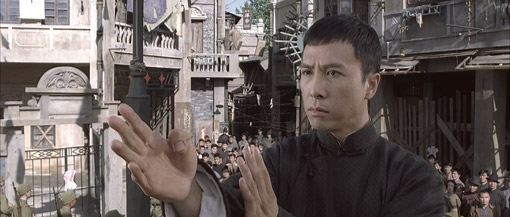|
As someone who idolised the late Bruce Lee in his youth, I really ought to have been a bit sharper when I first caught a glance of the title Ip Man, which for some peculiar reason my distracted brain read as I.P. Man, prompting visions of a superhero who ensures fast internet connections. But as those who know their martial arts history and actually read titles properly will know, Ip Man – or more accurately Yip Man – was the first and still the most celebrated teacher of a style of kung fu known as Wing Chun, and whose later students included the aforementioned Bruce Lee. Wilson Yip's film, a huge hit on home turf (it made over over HK$2.8 million in just three weeks*), is set during the 1930s before Yip began formally teaching Wing Chun and shortly before his homeland was invaded by the Japanese.
At the film's start, Yip Man is living in comfortable surroundings in the Fo Shan district of China, an area famed for its martial arts schools. He is unique amongst the district's masters in that he does not take on students, though a quick practice session with the enthusiastic young Lin is enough attract an instant audience and annoy Yip's wife Wing-sing, who is at best irritably tolerant of her husband's devotion to his martial art. When skilled but brutal northern grandmaster Jin visits the area and systematically defeats all of the local masters in combat, Yip responds to a quiet plea from police captain Li Chiu to restore the district's honour, and gives the scornful Jin a sharp lesson in the effectiveness of Wing Chun. But in 1938 the lives of everyone in Fo Shan are turned upside when it is occupied and brutally suppressed by the invading Japanese army, plunging even Yip and his family into poverty. Commanding the local forces is karate master General Miura, who amuses himself by arranging martial arts contests that pit his men against local challengers, who fight for a bag of rice to feed their family if they win. As soon as he sees Yip in action, Miura becomes determined to face him in combat, but Yip has no intention of cooperating with those who have taken his country.

Let's get one thing straight – Ip Man is no straight biography of its title character but a martial arts actioner that takes inspiration from his life story. Much of it thus plays to the standard genre formula, complete with angelic heroes, unspeakably evil villains, decent ordinary folk who get beaten seven ways from Sunday, and violent vengeance dished out those who have wronged the good. Thus when Jin stomps into town and beats up the Fo Shan masters, we know that Yip will put his reluctance to fight on hold and beat the man silly. And when one of Yip's friends is killed in a fight with Miura, it's only a matter of time before Yip returns the beating with serious interest.
All of which is fine by me. As has been repeated many times on this very site, martial arts cinema is formulaic by its very nature and the primary rewards lie not in the originality of its plots but in the presentation, performance and choreography of its combat, and on this score Ip Man strikes gold. Although the wire work is occasionally visible in acrobatics that could not have been achieved any other way, this is old-school screen fighting at its blistering best, where we get to appreciate the physical skills of the performers and the inventiveness of the fight arranger, and where the director understands how best to showcase both instead of burying them in a blizzard of machine-gun editing. Choreographed by the legendary Sammo Hung, the fights are superbly staged, the breathless pace and comic overtones of Yip's extended first battle with Jin taking a considerably darker turn when he defeats ten Japanese opponents in a wince-inducing fury of breaking bones and vicious multiple-contact hits.
What may not sit so comfortably with non-Chinese audiences is the sometimes crude demonising of the Japanese characters. Now I don't necessarily have a problem with the Japanese being cast as the bad guys here – they have been playing this role in Hong Kong martial arts cinema almost since its inception, and the brutal nature of their occupation of China during the Sino-Japanese war is still a source of resentment for many Chinese. But in a movie made in 2008 you expect them to have a little more depth than they have here, with Miura's unsmiling ruthlessness topped at every turn by right-hand man Sato, who with his regulation round spectacles and sadistic bullying is only shy of a set of buck teeth to turn him into a WW2-era cartoon Jap.

Yip, on the other hand, is an almost saintly figure, a man so decent and pure of heart that in a position of real power you suspect he could single-handedly bring about world peace and reverse the effects of global warming. That he is still an engaging and three-dimensional screen character is down largely to a winningly low-key performance by genre legend Donnie Yen, who despite rarely varying his expression is at his charismatic best here, and at forty-five is showing no sign whatever of slowing down. He's ably supported on all fronts by Fan Siu-Wong as grand master-turned-bandit Jin, and Japanese actor Ikeuchi Hiroyuki does a solid job in convincing us of Miura's deadly fighting skills, despite being new to action cinema and martial arts. There's some nice casting in the non-combatant roles as well, with Lam Ka-tung's police captain Li – who lands a job as Miura's translator during the occupation – the nearest the film comes to real character complexity, while first time actress and supermodel Xiong Dai-lin does a nice line in cool disapproval as Yip's wife Wing-sing, reluctantly giving her blessing for Yip to fight in their home by quietly telling him, "Don't break my things."
Ip Man is a martial arts film rooted in the genre's past, which is great news for the combat but not so good for character depth and international relations. But if you can tolerate the strident patriotism, history bending** and racial stereotyping – and if you want to get to the good stuff then you're gonna have to – then for its performances, its brisk story development and its immaculately staged fight sequences, Ip Man is pretty much the martial arts film event of the year, and sees a genre that was briefly but memorably dominated by an emerging Thai martial arts cinema back in the hands of those who gave it birth.
Not the most consistent Blu-ray transfer I've seen, with the otherwise perfectly toned contrast weakening noticeably in the darker scenes and intermittently losing the black levels to grey, an effect most visible when characters are out of the spotlight at Miura's dojo. But in well lit interior or daylight exterior scenes the picture is little short of stunning – the transfer on the DVD is impressive, but the texture, colour and sharpness on the Blu-ray image frankly leave it standing. The wide shots of the main street are astonishing in the level of clearly visible detail on display, and it's hard not to admire the work of the art director and his crew when the sets and fittings are so precisely rendered.
The choice between Dolby Digital 2.0 Cantonese or DTS-HD Master Audio 5.1 Cantonese is an unsurprisingly easy one, the sheer clarity and breadth of the DTS track giving it an immediate edge and really springing to life during the fight sequences, with whooshes directed around the room and some heavier blows and impacts beefed up by the LFE bass. The music is always nicely spread.
Whether you go for the Blu-ray or the double-disc DVD, there are a lot of extras here, though there is also a lot of information and content overlap between them. Some are sub-divided up into galleries and on the DVD the majority can be found on disc 2. All except the Tracing the Legacy featurette, the photo gallery and selected trailers are 576p on the Blu-ray.

The Trailer Gallery consists of a Teaser (1:17), the Theatrical Trailer (2:19), the UK Promo Trailer (2:06) and two TV Spots (0:32 each). The theatrical and UK promo trailers are 1080p. You can also find trailers for eleven other Cine Asia DVD and Blu-ray releases, some of them in HD.
The Interviews gallery contains nine interviews.
Wilson Yip (23:12) discusses his reasons for making the film, the pre-production work required, his views on the real Yip Man, and working with the lead players and Sammo Hung. He also talks about his expectations for its success and describes it at one point as being a film about patriotism, a movie about the Chinese people and for the Chinese people. In a slightly distracting visual tic, the interview repeatedly dissolves between two very similar shots of Yip filmed from different sides of the line of action, causing his eye-line to repeatedly shift from left to right and back again.
Donnie Yen (22:09) talks about preparing for the shoot (he knew little about the Wing Chun style at the film's start), playing the role of Yip Man, his most memorable scene, being re-teamed with director Yip, and working with newcomer Xiong Dai-lin. Asked to encourage audiences to see the film, he talks about martial arts movies as a cultural heritage and states that they are unique to China, a statement the likes of Prachya Pinkaew and Tony Jaa would doubtless take issue with. The interview has the same left-right visual tic as the one above.
There are shorter interviews with actors Lam Ka-tung (8:56), Ikeuchi Hiroyuki (7:45), Fan Sui-wong (4:50), Xiong Dai-lin (7:49) and Simon Yam (2:53). All are asked about their character, their most memorable scene, and what it was like working with Donnie Yen, Wilson Yip and Sammo Hung. The answers are universally upbeat, but engagingly so. Xiong talks briefly about her first acting experience and Ikeuchi on appearing in his first action film. The two camera set-up is used here as well, but is less distracting.
Sammo Hung (8:02) is interviewed on the main street set at what sounds like midway through the shoot. He's also asked about working with Yen and Yip and reveals that Ikeuchi had never done a fight scene before this film and knew nothing about martial arts, though admits that he's improving and that he's a hard working actor whose serious approach they could all learn from. Almost everyone interviewed is asked to encourage us to see the film, a request Sammo responds to with almost manic enthusiasm.
Ip Chun (3:27) offers the prospect of an interview with Yip Man's eldest son, but after a few words from him about his involvement with the film we move on to snippets from Wilson Yip and Sammo Hung's interviews above and are given a too-brief glimpse of Ip teaching Wing Chun moves to Yen.
The Making Of gallery has four entries.
The unfussily titled Making of (18:37) is a busy EPK featurette in which brief interviews with all of the main players and filmmakers (most of which are taken from the longer interviews detailed above) are cut with behind-the-scenes and press conference footage, some of which is recycled for the featurettes below. There's a fair amount of low key back-slapping and it all ends with snippets from the above mentioned individual encouragements to see the film.
Pre-Production (2:03) is a short set-to-music series of behind-the-scenes and press conference clips, doubtless used as a pre-release teaser.
Shooting Diary (3:28) is not a diary at all but another promotional short comprised of behind-the-scenes clips cut with stills and film extracts, all set to heroic music.
Behind the Scenes Photo Gallery (2:02) features just 17 behind-the-scenes stills but earns top marks for making them full screen and 1080p on the Blu-ray.
Gala Premiere (1:50)
Quick-cut snippets of the premiere of the title, all set to music and over almost before it's begun.
The Location / Set Design gallery contains three brief featurettes on the film's set design. In The Foshan Cotton Mill (2:25), actor Simon Yam, who plays Ip's good friend Zhou Qing Quan, describes the process of transforming an abandoned factory into a working cotton mill for the film, illustrated with making-of footage. In Foshan's Main Street and Mo Goon Street (2:02) it's Fan Siu-Wong's turn to sing the praises of the art director and his crew, although the revelation that they had hung a staggering four thousand historically accurate signs on and in the various establishments that line the main street tends to justify his acclaim. In Ip Man's Residence (2:04) director Wilson Yip outlines the approach to creating this particular interior set.
There are five Deleted Scenes, each framed 4:3 and timecoded, ranging from 20 seconds to 1 minute 36 seconds in length. Three are of very real interest, revealing as they do the fate of three of the key characters.
From Ip Man to Bruce Lee – Tracing the Legacy (14:58)
An interesting extra apparently exclusive to this disc in which Guro Dan Inosanto, Bruce Lee's most senior pupil, talks a little about Lee and Yip Man and demonstrates the foundational principles of Wing Chun and how they evolved in Lee's own variant, Jeet Kune Do. This extra is 1080p on the Blu-ray.
An entertaining, smartly made old-school martial arts actioner that's also saddled with an old-school approach to character and Sino-Japanese relations. If you can deal with these then you're in for a treat – Yen is on top form, Sammo's choreography is a treat and Wilson Yip gives a masterclass in staging martial arts for the camera. The DVD looks good, but save for a few dips in the contrast stability the Blu-ray looks superb, and while the extras may overlap, no-one can complain they've been short-changed here. Recommended.
* Somewhat inevitably, given the film's box-office success, a sequel is already in production, again directed by Wilson Yip and starring Donnie Yen, with Sammo Hung doubling as action director and co-star. This will concentrate on Yip's move to Hong Kong and his establishment of his first formal Wing Chun school.
** According to Yip Man's maternal nephew Lo Man Kam (article here), the occupying Japanese did indeed hear of Ip's reputation as a fighter and invite him to become their coach, a request he refused. The Japanese then ordered another martial arts master named Leung to challenge Yip for a fight, which after repeated refusals he finally accepted and won. Increasing pressure from the Japanese prompted Yip to leave Fo Shan, but he continued to assist the Chinese government in the fight against the occupying forces.
|